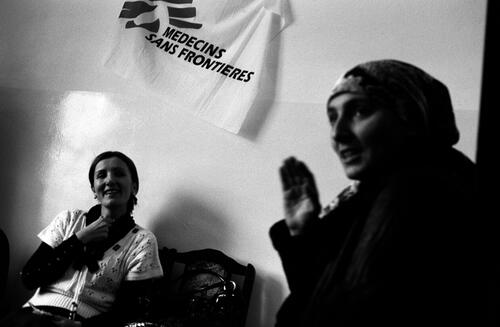Médecins Sans Frontières (MSF) has been present in Ingushetia since 1999. During that period MSF provided medical care to both the local population and displaced people who fled the conflicts in neighbouring North Ossetia and Chechnya.
MSF teams organised mobile clinics and provided counselling in spontaneous settlements and tented camps where displaced people lived.
MSF supported Ingush medical facilities through donations of drugs and medical supplies. From 2005-2010 it ran a medical centre providing primary healthcare for vulnerable groups in the population, and more than 66,000 patients received treatment. In 2010-2011 MSF also ran a programme to support the ambulance service in Ingushetia.
Over the past decade civilians living in Ingushetia have suffered from the psychological effects of ongoing violence and the deaths or disappearance of loved ones. The MSF programme sought to assist these survivors through group and individual therapy, also providing psychological first aid and psycho-educations activities.
In 2012, MSF had nine mental health counsellors who worked closely with doctors in six hospitals: in the main city of Ingushetia, Nazran, two district hospitals in Malgobek and Sunzha and three villages, Sagopshi, Ekajevo and Galashki.
Psychosocial assistance
Since 2003, MSF’s mental health programme provided psychosocial assistance to more than 5,600 patients. Mental health counsellors reported treating conditions such as anxiety, mood related problems and grief, connected to psychological violence, abuse, injury, physical violence or the death of loved ones.
Most importantly, counsellors provided a safe and confidential place where patients were free to talk, unburden themselves and feel understood.
In the autumn of 2012, following extensive discussions with the government of Ingushetia, senior officials thanked MSF for its efforts but indicated that further assistance was no longer required.
MSF activities in the North Caucasus
A patient of the MSF psychosocial programme says: “I have lost my four children through war and violence, I thought also I was going to die of pain and grief; I thought I was going crazy. With help from a MSF counsellor I found help and relief. And although I still have the need to talk to people but now that MSF has left, I no longer have this opportunity.”
MSF remains present in the North Caucasus and committed to the population in need of our assistance, managing a tuberculosis diagnosis and treatment programme, a psychosocial programme, a reproductive health and paediatrics programme and a cardiovascular support programme in neighbouring Chechnya, in partnership with the Chechen Ministry of Health.



